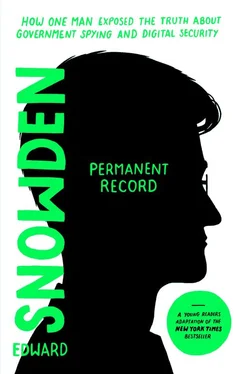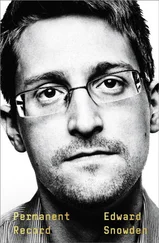It was a surreal dynamic. I had never met any journalists before serving as their source. The first time I ever spoke aloud to anyone about the US government’s system of mass surveillance, I was speaking to everyone in the world with an internet connection. In the end, though, regardless of how rumpled I looked and stilted I sounded, Laura’s filming was indispensable, because it showed the world exactly what happened in that hotel room in a way that newsprint never could. The footage she shot over the course of our days together in Hong Kong can’t be distorted. Its existence is a tribute not just to her professionalism as a documentarian but to her foresight.
I spent the week between June 3 and June 9 cloistered in that room with Glenn and his colleague from the Guardian , Ewen MacAskill, who joined us a bit later that first day. We talked and talked, going through the NSA’s programs, while Laura hovered and filmed. In contrast to the frenetic days, the nights were empty and desolate. Glenn and Ewen would retreat to their own hotel, the nearby W, to write up their findings into articles. Laura would disappear to edit her footage and do her own reporting with Bart Gellman of the Washington Post , who never made it to Hong Kong but worked remotely with the documents he received from her.
On June 5, the Guardian broke Glenn’s first story, the Foreign Intelligence Surveillance Act court order that authorized the NSA to collect information from the American company Verizon about every phone call it handled. On June 6, it ran another story by Glenn, pretty much simultaneously with a similar account in the Washington Post by Laura and Bart. I knew, and I think we all knew, that the more pieces came out the more likely it was that I’d be identified, particularly because my office had begun emailing me asking for status updates, and I wasn’t answering. Glenn and Ewen and Laura were unfailingly sympathetic to my ticking time-bomb situation. But they never let their desire to serve the truth be influenced by my circumstances. And following their example, neither did I.
As the revelations ran wall to wall on every TV channel and website, it became clear that the US government had thrown the whole of its machinery into identifying the source. It was also clear that when they did, they would use the face they found—my face—to evade accountability: Instead of addressing the revelations, they’d challenge my credibility and the motives of “the leaker.”
The only hope I had of fighting back was to come forward first and identify myself. I’d give the media just enough personal detail to satisfy their mounting curiosity, with a clear statement that what mattered wasn’t me, but rather the subversion of American democracy. Then I’d vanish just as quickly as I’d appeared. That, at least, was the plan.
Ewen and I decided that he’d write a story about my IC career, and Laura suggested filming a video statement to appear alongside it in the Guardian . In it, I’d claim direct and sole responsibility as the source behind the reporting on global mass surveillance. But we just didn’t have the time for her to go through everything she’d shot in search of snippets of me speaking coherently and making eye contact. What she proposed, instead, was my first recorded statement, which she started filming right there and then—the one that begins “Uh, my name is Ed Snowden. I’m, ah, twenty-nine years old.”
Hello, world.
* * *
While I’ve never once regretted tugging aside the curtain and revealing my identity, I do wish I had done it with better diction and a better plan in mind for what was next. In truth, I had no plan at all. I hadn’t given much thought to answering the question of what to do once the game was over, mainly because a winning conclusion was always so unlikely. All I’d cared about was getting the facts out into the world. I figured that by putting the documents into the public record, I was essentially putting myself at the public’s mercy. No exit strategy could be the only exit strategy.
If I’d made preexisting arrangements to fly to a specific country and seek asylum—the act of fleeing one’s country for the protection of another—I would’ve been called a foreign agent of that country. Meanwhile, if I returned to my own country, the best I could hope for was to be arrested upon landing and charged under the Espionage Act. That would’ve entitled me to a show trial deprived of any meaningful defense, a sham in which all discussion of the most important facts would be forbidden. I almost certainly would’ve been found guilty.
The major impediment to justice was a major flaw in the law, a purposeful flaw created by the government. Someone in my position would not even be allowed to argue in court that the disclosures I made to journalists were beneficial. Even now, years after the fact, I would not be allowed to argue that the reporting based on my disclosures had caused Congress to change certain laws regarding surveillance, or convinced the courts to strike down a certain mass surveillance program as illegal, or influenced the attorney general and the president of the United States to admit that the debate over mass surveillance was a crucial one for the public to have. All these claims would be deemed not just irrelevant but inadmissible in court.
The only thing my government would have to prove is that I disclosed classified information to journalists, a fact that is not in dispute. This is why anyone who says I have to come back to the States for trial is essentially saying I have to come back to the States for sentencing. And the sentence would, now as then, surely be a cruel one. The penalty for disclosing top secret documents is up to ten years per document.
From the moment Laura’s video of me was posted on the Guardian website on June 9, I was marked. There was a target on my back. I knew that the institutions I’d shamed would not relent until my head was bagged and my limbs were shackled. And until then—and perhaps even after then—they would harass my loved ones and disparage my character. I was familiar enough with how this process went, both from having read classified examples of it within the IC and from having studied the cases of other whistleblowers and leakers.
As sure as I was of my government’s indignation, I was just as sure of the support of my family, and of Lindsay, who I was certain would understand—perhaps not forgive, but understand—the context of my recent behavior. I took comfort from recalling their love: It helped me cope with the fact that there was nothing left for me to do, no further plans in play. I could only hope that my fellow citizens, once they’d been made aware of the full scope of American mass surveillance, would mobilize and call for justice. They’d be empowered to seek that justice for themselves, and, in the process, my own destiny would be decided. This was the ultimate leap of faith: I could hardly trust anyone, so I had to trust everyone.
* * *
Within hours after my Guardian video ran, one of Glenn’s regular readers in Hong Kong contacted him and offered to put me in touch with Robert Tibbo and Jonathan Man, two local attorneys who then volunteered to take on my case. These were the men who helped get me out of the Mira when the press finally located me and besieged the hotel. As a diversion, Glenn went out the front lobby door, where he was immediately thronged by the cameras and mics. Meanwhile, I was bundled out of one of the Mira’s myriad other exits, which connected via a sky bridge to a mall.
I like Robert—to have been his client is to be his friend for life. He’s an idealist and a crusader, a tireless champion of lost causes. Even more impressive than his lawyering, however, was his creativity in finding safe houses. While journalists were scouring every five-star hotel in Hong Kong, he took me to one of the poorest neighborhoods of the city and introduced me to some of his other clients, a few of the nearly twelve thousand forgotten refugees in Hong Kong. I wouldn’t usually name them, but since they have bravely identified themselves to the press, I will: Vanessa Mae Bondalian Rodel from the Philippines, and Ajith Pushpakumara, Supun Thilina Kellapatha, and Nadeeka Dilrukshi Nonis, all from Sri Lanka.
Читать дальше












